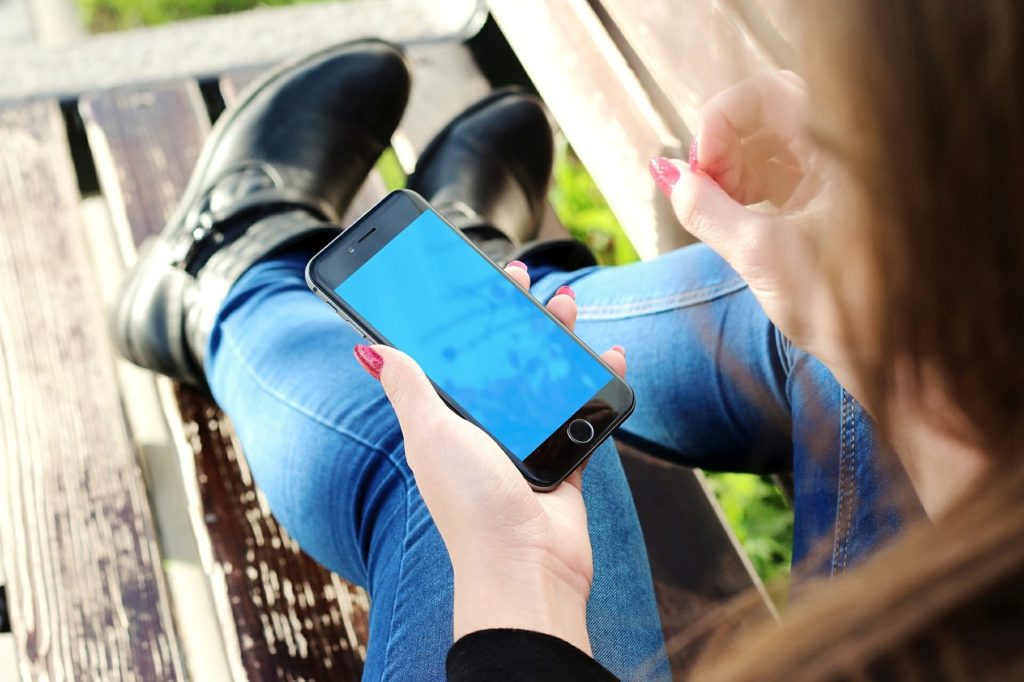- Calls to this hotline are currently being directed to Within Health, Fay or Eating Disorder Solutions
- Representatives are standing by 24/7 to help answer your questions
- All calls are confidential and HIPAA compliant
- There is no obligation or cost to call
- Eating Disorder Hope does not receive any commissions or fees dependent upon which provider you select
- Additional treatment providers are located on our directory or samhsa.gov
Interesting Eating Disorder Recovery Apps

Technology can be an asset or a liability to recovery. There is no denying that apps and social media have perpetuated diet culture ideals and made disseminating these ideals far easier than in days past but there are still eating disorder recovery apps that help those struggling in recovery.
In 2020, it is clear that the solution, for many, cannot be to delete all social media and phone apps. Despite algorithms helping paid advertisers get more “screen time,” the individual user still has control over how they curate their apps, and social media feeds. With this in mind, apps have been made that encourage recovery ideals as opposed to diet culture ideals.
Eating Disorder Recovery Apps and Their Effect
There is little research into how technology interacts with eating disorder recovery, as many of the advancements are so new there has not been time for research. One study did analyze the results of what studies do exist to learn more about technology and eating disorder treatment.
The study concluded that “technology ranging from text messages to Internet-guided self-help are viable ways to enhance or deliver multiple levels of treatment for EDs [1].”
Further, they concluded that “interactive forms of technology-based interventions in less severe populations yield the greatest results and show the greatest promise [1].”
This provides an indication that recovery apps may be a valuable addition to treatment and recovery interventions; however, they should not be used to replace higher-level severity disorders.
“Recovery Record”
 Listed as the first suggested app of the National Association of Anorexia Nervosa and Associated Disorders (ANAD), “Recovery Record” allows individuals to chart their progress, log their meals, and check-in with their emotional experience of recovery [2].
Listed as the first suggested app of the National Association of Anorexia Nervosa and Associated Disorders (ANAD), “Recovery Record” allows individuals to chart their progress, log their meals, and check-in with their emotional experience of recovery [2].
In each meal log, the app encourages individuals to enter information such as:
- Did you skip this meal?
- How are you feeling overall?
- Which feelings are you experiencing (and allows you to choose more than one and rank the intensity)?
- Who did you eat with?
- Where did you eat?
- How long ago did you eat?
- Portion size?
- What did you eat and drink? (You can add a photo of this as well)
- A “Thought Diary” to give a narrative of one’s experience.
It is imperative that the recovery app have questions related to meals that do not encourage any eating disorder or diet-culture-related behaviors. Individuals can also “Check-In” about their thoughts, feelings, behaviors, triggers, and goals, and log these as well as collect rewards, scrapbook, reasons to recover, and affirmations.
Finally, individuals can connect with their Dietician over the app to help their treatment team gain awareness of where they are in their recovery.
“Rise Up + Recover”
This app, from the blog Recovery Warriors, is based in Cognitive Behavioral Therapy (CBT). The app opens to a page with a daily inspirational quote and a button that allows the individual to “Check-In” about their feelings, actions, or drug/medication use.
On the bottom, individuals can click small graphics to log their meals in a similar fashion to Recovery Record. The biggest difference in this feature is that individuals can identify the target behaviors they may have engaged in. Another button provides Coping Skills such as journal activities, body image, “911 Distress,” mindfulness, and relationships.
Finally, the “Extras” section sends users to the Recovery Warriors website for music and articles or to their podcast and allows them to find support. Users can also export their daily or weekly summary as a PDF to share with their treatment team.
Eating Disorder Recovery App “Jourvie”
A final app recommended by ANAD is “Jourvie,” which ANAD reports, “focuses less on what you eat, and more on how you feel about your food [2].” The app has features to provide coping strategies and, much like the other two apps, printable records that one can share with their treatment team.
It is important to note that the Jourvie website states they are currently re-designing the app, and it will return to App Stores soon. However, the corresponding app for parents or relatives that are concerned their child may be struggling with disordered eating.
All of these apps are not intended for use as a replacement for treatment or therapy; however, they provide a wonderful addition that can help a treatment team provide the best support and the individual work toward recovery.
Resources:
[1] Shingleton, R. M., Richards, L. K., Thompson-Brennan, H. (2013). Using technology within the treatment of eating disorders: a clinical practice review. Psychotherapy, 50:4. [2] Unknown (2020). Helpful apps. National Association of Anorexia Nervosa and Associated Disorders. Retrieved from https://anad.org/education-and-awareness/online-resources/helpfulapps/.About the Author:
 Margot Rittenhouse, MS, PLPC, NCC is a therapist who is passionate about providing mental health support to all in need and has worked with clients with substance abuse issues, eating disorders, domestic violence victims, and offenders, and severely mentally ill youth.
Margot Rittenhouse, MS, PLPC, NCC is a therapist who is passionate about providing mental health support to all in need and has worked with clients with substance abuse issues, eating disorders, domestic violence victims, and offenders, and severely mentally ill youth.
As a freelance writer for Eating Disorder Hope and Addiction Hope and a mentor with MentorConnect, Margot is a passionate eating disorder advocate, committed to de-stigmatizing these illnesses while showing support for those struggling through mentoring, writing, and volunteering. Margot has a Master’s of Science in Clinical Mental Health Counseling from Johns Hopkins University.
The opinions and views of our guest contributors are shared to provide a broad perspective on eating disorders. These are not necessarily the views of Eating Disorder Hope, but an effort to offer a discussion of various issues by different concerned individuals.
We at Eating Disorder Hope understand that eating disorders result from a combination of environmental and genetic factors. If you or a loved one are suffering from an eating disorder, please know that there is hope for you, and seek immediate professional help.
Published October 21, 2020, on EatingDisorderHope.com
Reviewed & Approved on October 21, 2020, by Jacquelyn Ekern MS, LPC

The EatingDisorderHope.com editorial team comprises experienced writers, editors, and medical reviewers specializing in eating disorders, treatment, and mental and behavioral health.

